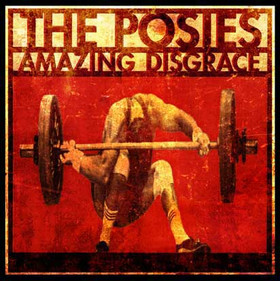FOREWORD: Got chummy with fab pop melodicists, the Posies, at Maxwells in 2000. I first met ‘em a few years earlier at Mercury Lounge’s backstage basement. Talk about mainstream radio missing out on an exuberant straight-ahead rock band. In the ‘70s, they’d kill for the Posies. Then again, Big Star died on the vine at the time.
Nonetheless, charismatic singer-songwriter-guitarists’ Jon Auer and Ken Stingfellow, who’d met at the University of Washington, never met a contagious pop hook they didn’t like or try to enthusiastically emulate. The dynamic pop duo, who’d go on to shelve the Posies name for awhile, finally reunited in the studio for the first time in seven years for ‘05s reliable Every Kind Of Light.
Since then, the married Auer has laid low while Stringfellow continues to make efficient solo records like ‘97s This Sounds Like Goodbye, ‘01s Touched, and ‘04s Soft Commands. I’ve included my 2000 interview supporting a live Posies disc and an ’01 phone interview with Stringfellow concerning Touched. Both articles originally appeared in Aquarian Weekly.
Prior to Seattle’s ‘91 grunge explosion, retro-minded pop-rooted bands such as the Young Fresh Fellows, the Fastbacks, and Hammerbox seemed poised for large-scale success. Born out of a burning desire to re-create the fertile era of post-Beatles rock and roll, these highly charged individuals maintained an ambitious DIY spirit that indirectly rubbed off on 4-track lo-fi home recording heroes such as Sebadoh, Liz Phair, and Pavement.
Coming on like some long lost Hollies tribute band, the Posies, led by multi-instrumentalists Jon Auer and Ken Stringfellow, seemed like the perfect harmony-related combo to break out of the cozy confines of the Pacific Northwest when their second release, Dear 23, hit the shelves. But besides the benefit of having an enormous rock radio staple with Frosting On The Beater’s catchier-than-hell “Dream All Day,” the Posies never managed to break out of the box like most of their grunge peers. Yet despite being somewhat overlooked, the Posies went on to deliver the more visceral Amazing Disgrace and its ironically titled ‘98 follow-up, Success.
But how did one of the most revered underground pop treasures originally form?
Auer fondly recalls, “Ken and I were involved with different bands and we’d always make fun of the bands we were in. Eventually, all those people fell by the waste side and there was just the two of us left.”
Done on a whim, the live In Case You Didn’t Feel Like Plugging In succinctly refines some now vintage studio favorites for a small, encouraging hometown crowd at Seattle’s Showbox, inspiring an appreciable acoustic tour that followed. Featuring a nifty version of “Grant Hart,” the sensitive “Every Bitter Drop” (dedicated to “all the alcoholics”), and a pure, stripped down take of the shoulda-been a hit, “Flavor Of The Month” (which gains subtle strength from its tear-stained vocalizing). Interestingly, the earthy harmonies on “Believe In Something Other (Than Yourself)” could be mistaken for prime David Crosby and Graham Nash.
 Taking advantage of their large catalogue of original songs, Stringfellow and Auer recently played and sang for nearly two hours at Maxwells in Hoboken. FYI: On his own, Auer recently released a single and an EP while Stringfellow recorded the “Saltine” EP. I spoke to the duo about the Posies past and present over dinner prior to their set.
Taking advantage of their large catalogue of original songs, Stringfellow and Auer recently played and sang for nearly two hours at Maxwells in Hoboken. FYI: On his own, Auer recently released a single and an EP while Stringfellow recorded the “Saltine” EP. I spoke to the duo about the Posies past and present over dinner prior to their set.
Did the early ‘90s grunge explosion in Seattle inform Frosting On The Beater? That album was much harder-edged than its ‘89 predecessor, Dear 23.
KEN STRINGFELLOW: The difference was we worked with British producer John Leckie for Dear 23. He gave us a lush sound. There was a real dichotomy between how we sounded as a band. Since he was in charge, he put in his influence. Whereas, on Frosting, Don Fleming’s production was closer to how the band sounded naturally. He gave us a weird sonic landscape.
The next album, Amazing Disgrace, had a venomous tone. Did that reflect disillusionment felt by the Posies for never receiving full-scale recognition like scenesters Nirvana, Soundgarden, or Pearl Jam achieved?
KEN: I think we were probably edgier people at that point. We were probably mad at each other. We’re always as honest as we can be.
Tell me about the last Posies studio set, Success. I missed that one.
KEN: That was a record we made after we decided this is where we get off. Most of those songs were recorded for other records or we had done live. It was time for something different. We didn’t do a lot of touring for that record.
What was it like hitting the road as members of Alex Chilton and Jody Stevens’ re-incarnated Big Star during the ‘90s? Chilton had been a very volatile character prior to that.
KEN: He stopped drinking during the ‘80s. When Frosting came out, that’s when I started playing with Chilton and Stevens in the re-formed Big Star. It was at Columbia, Missouri, April 27, 1993, I believe.
Tell me about the 4 CD box set, At Least…At Last, coming out soon on Pop Llama Records.
KEN: There’s nothing from previous albums on it, except maybe demos that turned into album tracks. Box sets are fun. It makes us look like we’re important. It’s not like they’re bad songs. They just couldn’t fit on our other records.
How about the acoustic live set, In Case You Didn’t Feel Like Plugging In?
KEN: There’s a fine version of “Grant Hart” on it. Our songs were written as acoustic pieces. So this is how they were before the band got a hold of it. Plus, it’s easier to travel without a band.
Was it your love of ‘60s pop music that brought both of you together?
JON AUER: Sometimes we try to deny stuff about our influences. It gets annoying. But when CD’s first started coming out, and they were re-issuing Beatles albums my parents had owned, we bought Rubber Soul and Revolver. It was the first time we had listened to the British versions all the way through. Ken and I were sitting there listening intensely. Then, through that and knowing people working at record stores, we got into Odessey & Oracles by the Zombies, The Move, Left Banke, and Small Faces. At this point, we’ve got all of that in our collections. But we also relate to early New Wave and Goth like the Smiths. They were really great songwriters. On the Posies’ Failure debut, I was only sixteen. You look at the back cover and it looks like we could be the Cure. You’ll probably cringe when I say this, but Depeche Mode had a record called Black Celebration which was all written on guitar. Anyway, the songs sounded great. My point is a good song is a good song is a good song. It doesn’t matter. As for the Hollies comparison, we got so baked with that. But it’s totally fair. We did a version of their song, “King Midas In Reverse.” We’re just good music fans.
Did you ever feel cheated because the super catchy “Dream All Day” didn’t become a bigger mainstream hit?
JON: It doesn’t bother me that it didn’t sell a lot of records. What bothered me was DGC Records predicted we’d sell all those records then dropped the ball. They had Nirvana and Sonic Youth. I thought we had a lot of worthy singles. During our European Teenage Fanclub tour, we were debating what would be the next single. And it never happened. We got a big fan base out of it and I haven’t had a day job since I was sixteen. I travel, produce music, and make music when I want to. When the blitz of alternative band signings happened in ‘91/ ‘92, everyone thought bands like the Posies and the Afghan Whigs were going to be huge. But they pumped money into all these bands and then just gave up.
——————————————————–
 KEN STRINGFELLOW GETS ‘TOUCHED’
KEN STRINGFELLOW GETS ‘TOUCHED’
Dressed casually with hair dyed red, San Francisco-born singer-guitarist Ken Stringfellow sits conspicuously at a piano and then proceeds to illuminate Manhattan basement club, The Fez, by running through nearly a dozen new songs and a nifty take on the Beach Boys’ “Good Timin’.” Though between songs he’s self-deprecating discussing his skill at tickling the ivories, this co-founder (along with Jon Auer) of charming Seattle power pop combo, the Posies, plays elegantly as he sings along with utmost passionate and sincerity.
Besides revealing his most penetrating lyrical observations, Stringfellow’s belated solo debut, Touched, also unleashes his most flexible vocals. Whether whispering amorously, swooning majestically, or gliding gracefully, his fragile tenor celebrates joy and ecstasy or, conversely, exorcises dark anxieties and internal strife. Though he snickers about “looking like Edward Scissorhands” on the cover drawing for Touched, he goes on to say how music remains a lifetime compulsion he just can’t shake.
Stringfellow’s feathery vocal mellifluence caresses the solemn “This One’s For You,” a lightweight highlight layering Cathedral organ drones above Hammond-styled pipe organ blurbs. His gorgeous multi-harmonies layer the absorbing “Find Yourself Alone.” Guest Ron Preston’s pedal steel decorates the Country-licked heartfelt confession, “Down Like Me,” Melodee Karabin’s cello soothes the coil-y guitar confection “Spanish Waltz,” and Stringfellow’s harpsichord underscores the semi-Baroque grandeur of “Uniforms.” Only the chuggy folk acoustic “One Morning” and the orchestral toast, “Here’s To The Future,” lean on the usual six-string strum.
Somehow, during his busy schedule of solo piano performances, acoustic and electric sets with Auer, and the formation of the short-lived band, Saltine, Stringfellow has also found time to produce Damien Jurado’s critically acclaimed ‘99 album Rehearsals For Departure and temporarily join R.E.M. as a backup singer-instrumentalist.
 Touched indirectly reminded me of ‘70s singer-songwriters such as Carole King, James Taylor, and Cat Stevens with its sensitivity and personal revelations.
Touched indirectly reminded me of ‘70s singer-songwriters such as Carole King, James Taylor, and Cat Stevens with its sensitivity and personal revelations.
KEN: I certainly didn’t think of it that way. I don’t analyze myself that way. I would say I’m not attached to only one era. I listen to all kinds of music. I’m not particularly focused on one, but it’s all in there. I’d agree these are my most sensitive and open songs. One of the over-arching themes of this record is people having real emotions. That’s why the album is called Touched, to some degree. It hopefully helps people locate their most real feelings.
There’s a kind of relaxation that happens when you indulge yourself to the greatest degree. You’re free to go in any direction when you’re on your own. It’s hard to find a band situation everyone could indulge themselves 100%. You run out of space.
How does this compare to the “Saltine” EP you released last year.
KEN: That was just a 7″ with two songs. What’s interesting is both songs, “Reveal Love” and “Find Yourself Alone,” appear on this album in different form. The problem I had with Saltine is things were limited. It was guitar alternative music and I was thinking a little more broad. Hence, “Reveal Love” doesn’t have much guitar on the album version.
I thought “Find Yourself Alone” might have had something to do with your newfound solo status.
KEN: Yeah. Where is everybody?
Were there difficulties recording solo – having your ass on the line.
KEN: I didn’t encounter any problems. The whole thing was easier. I didn’t worry about hurting anyone’s feelings. When you’re in a band, you’re stuck with your role and some rules. You could be flexible, but to a point. It was great to have a huge amount of freedom. It was a relief. Tony Shanahan, a New Yorker who’s worked with Patti Smith, laid down some great bass on half the record. The drummer, Eric Marshall, is from North Carolina and Mitch Easter introduced me to him.
What did producer Mitch Easter add to Touched?
KEN: Technical skills. I wouldn’t say he produced the record. The main conceptual directions were from me. But he was the perfect technician and recordist. I’d have an idea how I wanted something to sound and he did it through different methods. He was dead on and did a superb job. There’s no way I could record myself like that.
“Uniforms” has one of the best hook lines you’ve ever written.
KEN: Awesome. It’s an interesting song about the ability or bravery of how we present ourselves and how much that could get compromised. It takes place in Germany in the 1930’s and he’s a military officer with a boyfriend. He thinks everything is going along great until the political thing gets ugly and he’s put in a situation where he has to make this total compromise and put his boyfriend to death.
Wow. Tell me about the new Posies EP, Nice Cheekbones & A Ph.D.
KEN: The title is an inside joke. Jon and I were talking about what every woman wants and what we don’t have. (laughter) The music is an interesting hybrid of being totally acoustic and being electric. There are really no drums per se, just some drum machine. It’s an in between band and duo type thing. We did it as a present to a friend of ours in Spain who’s celebrating the anniversary of his label. It was recorded in one day in Spain. Taking on a full length album comes across as being real serious, which I can’t be now due to time.
Do you ever feel cheated by pop radio never exposing the intrinsic pop of the Posies?
KEN: I don’t take it personally. When I was younger, these things seemed more important. But it’s not a reflection on the music. It would be nice if there were more outlets for music. We need an outlet in the middle of commercial and college radio.